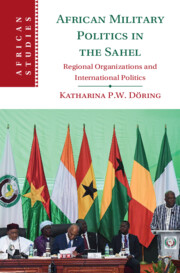Book contents
- African Military Politics in the Sahel
- African Studies Series
- African Military Politics in the Sahel
- Copyright page
- Contents
- Figures
- Tables
- Acknowledgements
- Abbreviations
- Introduction
- 1 Spatial Semantics in African Military Politics
- 2 Combating ‘Sahelistan’
- 3 Challenging the ‘Regions’ of the African Standby Force
- 4 Security and Intelligence Cooperation in the ‘Sahelo-Saharan Region’
- 5 African Military Coalitions and the ‘Core Countries’ in the Sahel
- 6 Towards a Critical Geopolitics of African Military Politics
- Appendix
- Bibliography
- Index
- African Studies Series
1 - Spatial Semantics in African Military Politics
Published online by Cambridge University Press: 02 November 2023
- African Military Politics in the Sahel
- African Studies Series
- African Military Politics in the Sahel
- Copyright page
- Contents
- Figures
- Tables
- Acknowledgements
- Abbreviations
- Introduction
- 1 Spatial Semantics in African Military Politics
- 2 Combating ‘Sahelistan’
- 3 Challenging the ‘Regions’ of the African Standby Force
- 4 Security and Intelligence Cooperation in the ‘Sahelo-Saharan Region’
- 5 African Military Coalitions and the ‘Core Countries’ in the Sahel
- 6 Towards a Critical Geopolitics of African Military Politics
- Appendix
- Bibliography
- Index
- African Studies Series
Summary
Chapter 1 provides the book’s theoretical bedrock and conceptual basis for a rereading of the techno-managerial policy world of the African Peace and Security Architecture (APSA) and an analysis of the African military politics that surround it. This is guided by a rethinking of space as relational, as well as the analysis of spatial semantics, observable structures of meaning-making in narratives that allow actors to shape social space. By way of the organigram as an artefact in the field of African peace and security, the chapter highlights the omnipresence of a representational understanding of space as well as its limits for grasping African military politics. Instead, a relational and processual ontology to understanding space is proposed, which allows us to conceptualize change and, consequentially, agency. Based on this reconceptualization of space, Döring draws on critical geopolitics as a tradition of thought that has allowed the observation of the shaping of space and highlighted the role of elites in doing so. These two conceptual moves are framed by an introduction to the spatiality of subsidiarity within APSA at the beginning of the chapter and by a discussion of the role of spatial semantics in African military politics at the end.
Keywords
- Type
- Chapter
- Information
- African Military Politics in the SahelRegional Organizations and International Politics, pp. 34 - 61Publisher: Cambridge University PressPrint publication year: 2023



